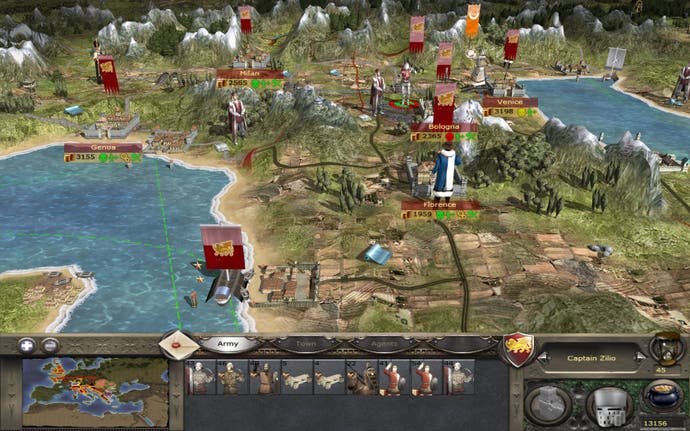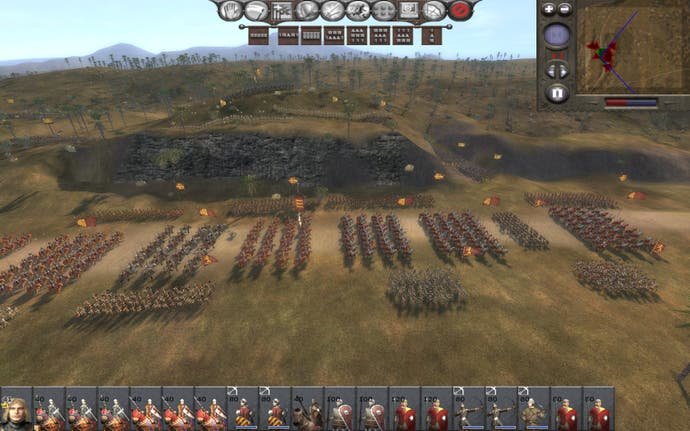Medieval 2: Total War
Still top of the pile.
Dissing Total War would be like strolling into an army base and proclaiming "you're all only doing this because you're sexually inadequate" - in either case, it'd be massively misinformed and essentially suicidal. But, can I get away with something like, oh, I don't know, "is there likely to be a time when I will not be strung up by my lungs and left for dead for inquiring as to what point one might safely inquire into whether there is a small danger that, at an indeterminate point in the future, some folk might start to question if Total War games might have a small risk of not being considered quite as groundbreaking as they currently are?" Oh, God. I've gone and done it, haven't I? I'm dead. I'm so dead.
Well, seeing as my days are numbered now anyway, maybe I'll just come right out and say it. As fabulous a game as Medieval 2 is, the majority of its (absolutely worthwhile) improvements and changes are on the subtle side. Earlier Total Wars Rome and Medieval 1 both felt like significant jumps on from their predecessors; Med 2 focuses on honing its revered formula rather than taking The Next Step. Right now, the honing is definitely enough and the return to the era that's the motherlode of historical warfare so very pleasing that there's no real cause for concern just yet. If there isn't more of a shake-up come the next game though, there'll be justification in looking a bit stern.
So, without question, we're still looking at the most detailed and absorbing strategy game to stalk the Earth. The real-time battles look incredible, a beefed-up Rome engine offering far more detailed landscapes as well as newly varied-looking soldiers. It's the change in animations rather than polygon count and face textures that makes the greatest difference - there's now much more of a sense of hundreds of people fighting, rather than a bunch of robots charging at each other. It's let down a little by continued use of an ugly and slightly clunky interface that'll still present a mild barrier to more casual players.
The strategy map is where it's at, though, and the home of the bulk of the improvements. Though the mechanics of actual warfare haven't, apparently, changed enormously since Roman times, the mechanics of Empire building have undergone a more dramatic shift. For instance, there's now a choice as to whether a city is dedicated to its populace and to prosperity, or whether it becomes a costly Castle that can churn out a stronger army. A well-placed castle may turn the tide of war, but can result in an empty purse and thus disaster. Perhaps the most compelling change, though, is in religion - as in Rome, the true power in Europe lies in Italy, but now it's the Vatican rather than the Senate. In other words, don't mess with the Pope.

His demands and expectations are more stringent than the taskmasters of the previous game, and disobedience carries twofold threats. Inquisition agents swarm locust-like across the map, scouring it for heretics and witches; if you're not in high favour with the Papacy, any major character, including generals, priests, princesses and merchants, not barricaded in a city might suffer horrible, screaming and sudden death. Continue to displease the hat - most commonly by attempting to seize an enticingly vulnerable city owned by a Pontiff-beloved state - and you may be excommunicated. This is, of course, rather more serious than not receiving Papal Christmas cards; in a worst-case scenario, you could find the entirety of Europe turned against you, as well as losing a serious cashcow in the shape of the Pope's invitations to well-rewarded missions and Crusades.
Combating this - without combat - is fascinating. Popes come and go, sometimes very quickly (two of 'em popped their Catholic clogs within the space of three turns in one campaign I played), offering an opportunity to elect a new Pontiff. If you've retained enough favour to still have one of your Priests on the College of Cardinals council, you can vote, picking a chap who may be predisposed towards you (or at least doesn't hate you). Essentially, the slate is immediately cleaned, as the new Pope turns his attention to his own elaborate political interests rather than those of his predecessor. One man's act of war is another's contrition, after all. If your Cardinal is favoured enough, there's even a chance you might get the keys to Vatican City yourself. Finish the main Campaign once, and another 12 factions are unlocked, several of which are Muslim. Formerly targets of European Crusades, the worm can turn by declaring Jihads on troublesome foes.
For more battle-inclined players, religion is a fussy thing to manage indeed, and occasionally becomes frustrating, especially as there's something of a split between your empire's overall favour with the big guy and that of your individual Priests. It's appropriate and welcome complexity though, and the single greatest proof that you're not in Rome anymore, Toto. If played very carefully, it's even a method of helping to expand your Empire without resorting to open warfare at every opportunity. In keeping with this approach, the new Merchant agents can squat on resource tiles, meaning a steady influx of extra revenue. A Merchant's a useful method of garnering income from territories you don't directly own, unless he suffers a hostile takeover from a rival merchant, in a non-violent scuffle that sidesteps most of the political machinations of their native Empires. This is, after all, business, not war.

It's symptomatic of the direction as a whole the game is taking. Though spectacular and as strategic as ever, the real-time battles sometimes feel like a distraction from the mesmerising high strategy of the world map, which increasingly does Civilization in a very non-Civilizationy way. Because you know you're going to get dragged away from your master plan for ten minutes or so, the temptation to hit 'auto-resolve' grows ever stronger, save for those situations where you're clearly on a back foot and taking direct control of an outnumbered force is the only hope of saving a vital general or family member's hide. Or maybe I'm just lazy.
It is in the battles, both real-time and on the turn-based map, that slight cracks show. In general, the AI feels a little more organic than previously, but I hit very occasional odd moments where an enemy squad suddenly ground to a halt and waited for death, or a group of my own archers simply refused to let loose the dogs of war unless I did a bit more frantic mouse-clicking. Such foibles are frankly rare, but jarring when they occur. There also seems to be a spot of over-compensation for complaints that enemy naval units rarely did much in Rome, to the point where I felt constantly hounded by rebel fleets in Med 2. Many were pointless, often out-and-out suicidal, others were simply hugely irritating barriers to simple acts like shipping a new governor to a far-off province. The only solution was to consistently send out massive, expensive armadas, or occupy coastal rebel cities sooner than I was necessarily comfortable with. It wouldn't rankle so much if there were an option to manage the sea battles myself and thus have a hope of pulling a shock victory out of the hat, but instead I only have the auto-resolve option, which very rarely seems to roll the dice in my favour. Naval combat's a growing part of the strategy map, and it'd be a major misstep if a real-time element of it wasn't introduced to the next Total War.
Which takes me back to the start, and that concern that next time, Total War really does need to do something a little different. There are hopeful signs that it might, as the closing stages of the Campaign lead into the New World, and a new foe in the shape of the Aztecs. It's only a minor addition here, but could bode well for a future Total War documenting colonialists and revolutionaries; a game, perhaps, of gunpowder, intercontinental trade and massive naval battles.
For now though, we can all rest safe in the knowledge that this is the best Total War yet. It's an absolute joy to take the accomplishments of Rome to the broader world, politicking and technology of the 11th to 16th centuries. Though familiar, MTWII is breathtaking in its depth, fiendishly challenging in all the right ways and a big old phlegmy spit right in the eye of anything else foolish enough to claim ownership of the strategy crown.



